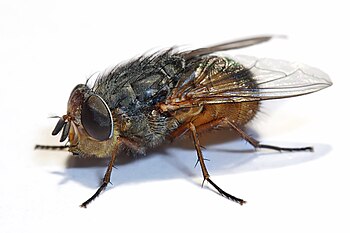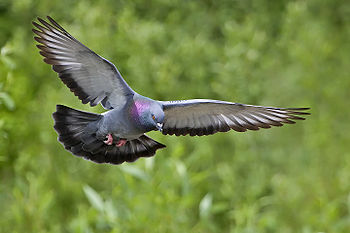|
Featured picture tools: |
These featured pictures, as scheduled below, appeared as the picture of the day (POTD) on the English Wikipedia's Main Page in April 2007. Individual sections for each day on this page can be linked to with the day number as the anchor name (e.g. [[Wikipedia:Picture of the day/April 2007#1]] for April 1).
You can add an automatically updating POTD template to your user page using {{Pic of the day}} (version with blurb) or {{POTD}} (version without blurb). For instructions on how to make custom POTD layouts, see Wikipedia:Picture of the day.Purge server cache
April 1

|
A statue of Louis Agassiz, a Swiss-American geologist, after the 1906 San Francisco earthquake, on the campus of Stanford University. It is said that when the earthquake struck, "[the statue of] Agassiz stuck his head underground to find out what was going on in the earth below and with his finger pointing saying, 'Hark! Listen!'" Photo credit: USGS
Recently featured:
|
April 2

|
An 1891 photograph of Cliff Palace, the largest cliff dwelling—a structure built within caves and under outcroppings in cliffs—in North America, located in what is now Mesa Verde National Park, Colorado, USA. There are about 150 rooms in the 288 ft (88 m) long structure, although only 25 to 30 of those were used as living space by Ancient Pueblo Peoples. it is estimated that the population of Cliff Palace was roughly 100–150 people. Photo credit: Gustaf Nordenskiöld
Recently featured:
|
April 3

|
A photo of strabismus surgery, surgery on the extraocular muscles to correct misalignment of the eyes, being performed. In this image, the face appears upside down, and the surgeon is disinserting the medial rectus muscle. A Castroviejo locking forceps is grasping the superior pole of the muscle, while a Manson-Aebli scissors does the cutting. The eyelids are being held by a Cook speculum. Photo credit: Bticho
Recently featured:
|
April 4

|
The initial step in a Mandelbrot set zoom sequence (see remaining steps) with a continuously colored environment. The Mandelbrot set is a fractal that has become popular outside of mathematics both for its aesthetic appeal and its complicated structure, arising from a simple definition. Image credit: Wolfgang Beyer
Recently featured:
|
April 5

|
A photochrom of St Isaac's Square in St Petersburg, Russia from the 1890s, as seen from the dome of St Isaac's Cathedral towards Marie Palace. Behind the palace, the capital of the Russian Empire is seen all the way to the Trinity Cathedral. The square is dominated by the equestrian Monument to Nicholas I. Image from: Detroit Publishing Co. (1905 catalogue)
Recently featured:
|
April 6

|
The head of a Rothschild's Giraffe (Giraffa camelopardalis rothschildi), a subspecies of giraffe found in Uganda and north-central Kenya. It has deep brown, blotched or rectangular spots with poorly defined cream lines and its hocks may be spotted. Photo credit: Fir0002
Recently featured:
|
April 7

|
A man riding a bucking bronco on the open range in Bonham, Texas, USA. The word is used in the United States and Canada to refer to an untrained horse and comes from the Spanish word bronco, meaning "rough", which in Mexican usage also describes a horse. It was then borrowed and adapted in American cowboy lingo. Modern rodeos include bronc riding as an event. In this sport, riders attempt to stay on a bronco for 8 seconds while holding on with only one hand. Photo credit: Erwin Smith
Recently featured:
|
April 8

|
A captive Mexican Wolf (Canis lupus baileyi) at the Sevilleta National Wildlife Refuge, New Mexico, USA. This critically endangered subspecies of the Gray Wolf once ranged from central Mexico to the Southwestern United States. In 1980, the last five known surviving members were captured to save the species. Now, over 300 wolves are taking part in a wolf reintroduction program, with at least fifty individuals in the wild. Photo credit: Jim Clark, USFWS
Recently featured:
|
April 9

|
A pile of saffron threads (each about 20 mm in length) from Iran. Saffron is a spice derived from the flower of the saffron crocus and is among the world's costliest spices by weight. In Western countries, the average retail price is $2200/€1550/£1100 per kilogram ($1,000/€700/£500 per pound). Besides its use as a seasoning, it has also been used in its history as fragrance, dye, and medicine. Photo credit: Rainer Zenz
Recently featured:
|
April 10

|
NASA astronaut Robert Curbeam (left) and European Space Agency (ESA) astronaut Christer Fuglesang participate in STS-116's first of three planned sessions of extra-vehicular activity (EVA) as construction resumes on the International Space Station. The landmasses depicted in the background are the South Island (left) and North Island (right) of New Zealand. Photo credit: NASA
Recently featured:
|
April 11

|
A juvenile Red-tailed Hawk eating a California Vole. This act, called predation, is a biological interaction where a predator species kills and eats others, known as prey. Predators are either carnivores or omnivores. Herbivores are usually treated separately, but from an ecological perspective, the activities of the herbivorous species that kill the organism they feed on is functionally the same as predation. Photo credit: Steve Jurvetson
Recently featured:
|
April 12

|
A female lesser brown blowfly (Calliphora augur), also known as the bluebodied blowfly. This species of blowfly is native to Australia. It is a common visitor to houses and is also noted as a perpetrator of flystrike on sheep. It lays living maggots unlike most blowfly species which lay eggs. Photo credit: Fir0002
Recently featured:
|
April 13

|
An Eastern Gray Squirrel (Sciurus carolinensis) eating a nut in St. James's Park, London. Although native to eastern North America, the species has been introduced into a variety of locations. In England, gray squirrels have mostly replaced native Red Squirrels and have no natural predators, which has added to their rapid population growth and has led to the species being classed as a pest. Photo credit: Diliff
Recently featured:
|
April 14

|
Wreckage of the RMS Titanic's bow as seen from the Russian submersible MIR I. The shipwreck had been underwater for just under 95 years at the time of the photo, and has decayed considerably. It was discovered in 1985 at a depth of 12,500 feet (3800 m), 13 nautical miles (24 km) from where the Titanic was originally thought to rest. The bow section, which had split from the stern, had embedded itself more than 60 feet (18 m) into the silt on the ocean floor and was mostly intact. Visits by tourists in submersibles and the recovery of artifacts are hastening the decay of the wreck. It is estimated that the hull and structure of the ship may collapse to the ocean floor within the next 50 years. Photo credit: NOAA and the Russian Academy of Sciences
Recently featured:
|
April 15

|
False-color Mars Reconnaissance Orbiter image of a side of the Chasma Boreale, a canyon in the polar ice cap of the Planum Boreum (north pole of Mars). Light browns are layers of surface dust, greys and blues are layers of water and carbon dioxide ice. Regular geometric cracking is indicative of higher concentrations of water ice. The Planum Boreum's permanent ice cap has a maximum depth of 3 km (1.9 mi). It is roughly 1200 km (750 mi) in diameter, an area equivalent to about 1½ times the size of Texas. The Chasma Boreale is up to 100 km (62.5 mi) wide and features scarps up to 2 km (1.25 mi) high. For a comparison, the Grand Canyon is approximately 1.6 km (1 mi) deep in some places and 446 km (279 mi) long but only up to 24 km (15 mi) wide. Photo credit: Mars Reconnaissance Orbiter
Recently featured:
|
April 16

|
Leonardo da Vinci's cartoon The Virgin and Child with St Anne and St John the Baptist combines two themes popular in Florentine painting of the 15th century: the Virgin and Child with St John the Baptist and the Virgin and Child with St Anne. St Anne's enigmatic gesture of pointing her index finger towards the heavens recurs in two of Leonardo's last paintings, his St John the Baptist and his Bacchus, and is regarded as the quintessential Leonardesque gesture. It currently hangs in the National Gallery in London. Artist: Leonardo da Vinci
Recently featured:
|
April 17

|
|
The Tower Bridge, a bascule bridge that crosses the River Thames in London, England, at twilight. It is close to the Tower of London, which gives it its name. It has become an iconic symbol of London and is sometimes mistakenly called London Bridge, which is the next bridge upstream. The bridge replaced the Tower Subway for carrying pedestrian traffic across the river. Photo credit: Diliff
Recently featured:
|
April 18

|
|
A series of images demonstrating a focus bracket, a technique useful in situations with limited depth of field, such as macro photography, where one combines the in-focus portions of multiple exposures digitally. The image on the left shows a single shot taken at f/11 with the features of the Wolf spider closest to the camera. The center image shows the features farthest from the camera. The image on the right shows a sequence of 8 incrementally focused images of the spider assembled to make a composite image in Adobe Photoshop. Photo credit: Fir0002
Recently featured:
|
April 19

|
Lewis Hine's 1920 Power house mechanic working on steam pump, one of his "work portraits", shows a working class American in an industrial setting. The carefully posed subject, a young man with wrench in hand, is hunched over, surrounded by the machinery that defines his job. But while constrained by the machinery, the man is straining against it—muscles taut, with a determined look—in an iconic representation of masculinity. Photo credit: Lewis Hine
Recently featured:
|
April 20

|
Allan Pinkerton (left), President Abraham Lincoln (center), and Major General John A. McClernand (right). This photo was taken not long after the Civil War's first battle on northern soil in Antietam, Maryland, on October 3, 1862. Pinkerton was the head of Union Intelligence Services at the time. He also, allegedly, foiled an assassination attempt against Lincoln. His wartime work was critical in Pinkerton's development, which he later used to pioneer the American private detective industry when he formed the Pinkerton National Detective Agency. Photo credit: Alexander Gardner
Recently featured:
|
April 21

|
Cartographic relief depiction showing the varying age of bedrock underlying North America. This image combines a geologic map and a shaded relief image. This combination reveals the geologic history of North America through the interrelation of rock type, topography and time. Regional surface processes as well as continent-scale tectonic events are exposed in the three dimensions of space and the fourth dimension, geologic time. From most recent to oldest, age is indicated by color: yellow, green, blue, red. Image credit: United States Geological Survey |
April 22

|
A whole and cross section of a red bell pepper (pepper in the UK and capsicum elsewhere in the Commonwealth). This cultivar of Capsicum annuum has a recessive gene that eliminates the capsaicin in the fruit. The pepper scores zero on the Scoville scale, meaning it has none of the "heat" that other chili peppers do. Photo credit: Fir0002 |
April 23

|
A male Rock Pigeon (Columba livia) in flight. This species of pigeon, native to western and southern Europe and North Africa, is known throughout the world, although pure Rock Pigeons are increasingly rare, having been displaced by the domesticated version. Some pigeon breeds such as homing pigeons have been extremely useful to humans. Photo credit: Alan D. Wilson
Recently featured:
|
April 24

|
|
This image features the Crystal Mountains within the Desolation Wilderness in the U.S. state of California with Lake Aloha in the foreground. This range is a subrange of the Sierra Nevada mountains. The southernmost and highest peak seen here on the left is Pyramid Peak, reaching 9,987 ft (3,026 m). The northernmost summit in the range is Tells Peak, however the peak all the way to the right in the image is in the middle of the range and is called Little Pyramid Peak. These mountains are visible from the city of Sacramento on clear days viewed from the other side. Photo credit: Mike Grindstaff
Recently featured:
|
April 25

|
A Black-bellied Whistling Duck (Dendrocygna autumnalis) in mid-flight. This species of whistling duck breeds in the southernmost United States and tropical Central and South America. As the name implies, these are noisy birds with a clear whistling waa-chooo call. Photo credit: Alan D. Wilson
Recently featured:
|
April 26

|
A whole and a half-shelled Persian Walnut (Juglans regia), also known as Common Walnut or English Walnut. This species of walnut is native from the Balkans, east through southwest and central Asia and the Himalayas to southwest China. Photo credit: AndonicO
Recently featured:
|
April 27

|
Boulevard du Temple, the first photograph of a person, taken by Louis Daguerre in late 1838 or early 1839 in Paris, France. The scene is of a busy street, but the city traffic does not appear due to the ten-minute long exposure time. The exception is a man in the lower left corner, who stood whilst getting his boots polished for long enough to show him in the picture. Photo credit: Louis Daguerre
Recently featured:
|
April 28

|
False-color detail of Jupiter's atmosphere, imaged by Voyager 1, showing the Great Red Spot and a passing white oval. The wavy cloud pattern to the left of the Red Spot is a region of extraordinarily complex and variable wave motion. To give a sense of Jupiter's scale, the white oval storm directly below the Great Red Spot is approximately the same diameter as Earth. Photo credit: Voyager 1
Recently featured:
|
April 29

|
Atlantic White-sided Dolphins, on a concrete-floored dock at the port of Hvalba, which is in the Faroe Islands, north of the United Kingdom. Whaling in the Faroe Islands has been practised since at least the 10th century. It is strongly regulated by Faroese authorities and is approved by the International Whaling Commission. Photo credit: Erik Christensen
Recently featured:
|
April 30

|
A dust storm rushes towards a military camp as it rolls over Al Asad Airbase, Iraq, just before nightfall on April 27, 2005. A dust storm (or sandstorm) is a meteorological phenomenon common in dry, arid and semi-arid regions, usually the result of convection currents created by intense heating of the ground. These currents then carry clouds of sand over large distances. Photo credit: Corporal Alicia M. Garcia, USMC
Recently featured:
|
Picture of the day archives and future dates